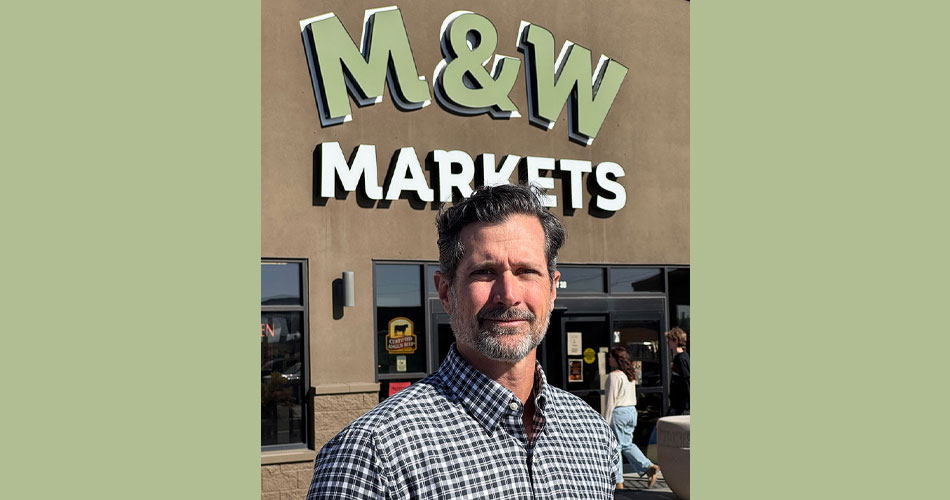M&W Markets has its headquarters in a dairy barn about five minutes from downtown Boise, Idaho. The barn was built more than 100 years ago, complete with two silos out front.
“We do take a little bit of pride in that, our agricultural roots as a family,” said Rich Tate, a member of the third generation to steward the business. He serves as VP of operations.
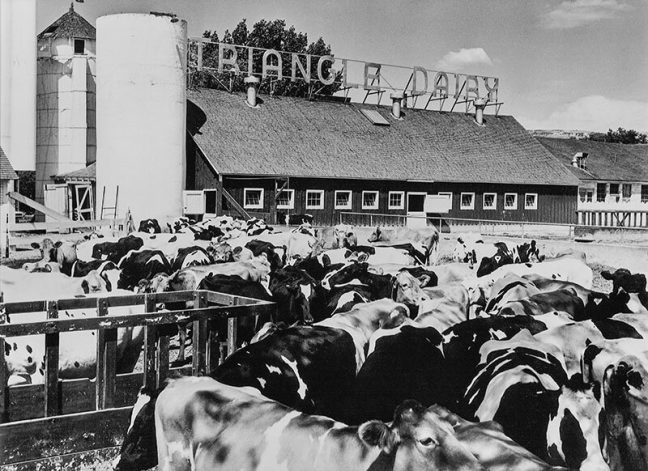
Tate’s family began homesteading on the land in the late 1800s, and his great-grandfather eventually started Triangle Dairy.
His grandfather, Pat Tate, was running the dairy when he bought an interest in a local grocery store on State Street in Boise in 1973.
The store, M&W Market, had been opened in 1952 by Louis Mendiola and Fred Wisner – the “M” and the “W.”
“They were very well-known grocers in the Boise Valley. ‘Treasure Valley’ as we call it,” Rich said.
Pat Tate and his cousin, Bill, acquired full ownership of the store in 1976; Pat Tate became M&W’s sole owner in 1989.
In 2023, company ownership passed to the second generation – Pat’s sons, Jim and Doug Tate.
Jim, president, is Rich’s father; Doug, controller/CFO, is his uncle. Doug’s sons Jack and Ryan also work in the business, in operations and finance, respectively, so there are five Tate family members involved in M&W Markets.
There is a fourth generation coming along, but it’s too early to know if their plans will involve following in their fathers’ footsteps.
But back to the barn HQ. Although the dairy land was sold in the early 2000s, M&W held on to the barn, and its heritage.
“We’ve got a lot of photos around the office from those times – delivery wagons, glass bottles, the whole thing,” Rich said.
Growing enterprise
Today, M&W operates nine grocery stores and nine convenience stores.
“We primarily serve rural markets in Idaho and Oregon,” Tate said. “We range from a neighborhood market just over 10,000 square feet, up to full-size supermarkets at 40,000-plus square feet – and we’ve got everything in between.”
Two locations also offer True Value Hardware stores, “just trying to make those a one-stop hub,” he said.
M&W’s grocery stores are located in Council, Nyssa, Boise, Parma, Gooding, Marsing and Filer, Idaho, plus two stores in Oregon, in Redmond and Vale. The Oregon stores, as well as the Marsing and Filer locations, were purchased from Logan’s Markets in late 2020.
When Tate came back to the family business in 2014, the company had six stores. Growth since then has been mostly through acquisition, and M&W continues to be interested in acquiring more. But “we’re interested right now in building new stores ground up,” he said. No sites have yet been identified, but “we’ve been looking.”
‘A common gathering place’
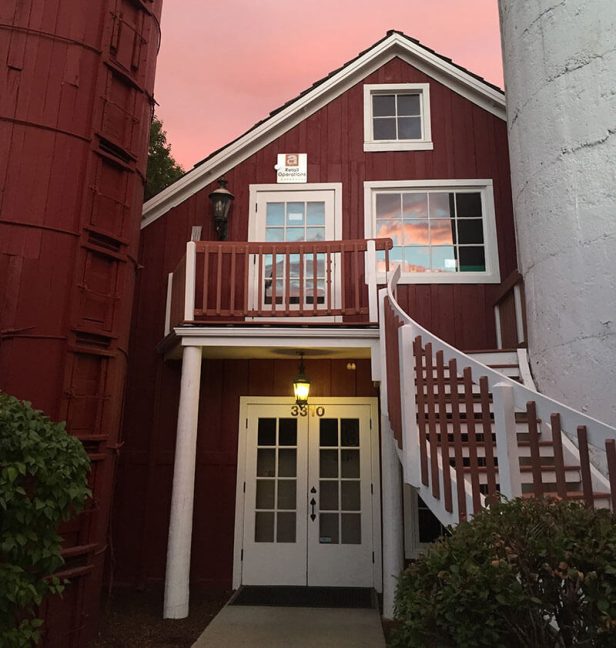
M&W’s small-town stores often are social hubs as much as they are retail destinations.
“Our stores are really like town centers; it’s a family atmosphere,” Tate said. “In the places where we operate … people still say ‘hi’ to each other on the street, people are on a first-name basis. We have a tagline that came from the old days, ‘The Friendliest Store in Town.’ That’s a big focus for us – friendliness and creating a common gathering place.”
Whatever the size of the store, there is a full-service meat department with a meat cutter.
“I would start with our meat departments,” Tate said of what offerings differentiate M&W in the marketplace. “I think that our meat cutters are some of the best around, and we hear from customers on a regular basis who are traveling really far to come and buy meat from our stores. They do a lot of custom orders, and they take a lot of pride in personalized service to the customer.”
When Tate has been in a store talking to a meat cutter, inevitably they are interrupted multiple times by customers stopping at the counter to chat.
“They don’t have the closed-off cutting rooms; they’re open counters,” he said of the intentional design of the departments. “That’s the vibe that we’re encouraging.”
Cashiers are encouraged to stand out in front of their lanes if they’re not serving anybody at their register to make sure customers can see that they’re ready to serve.
“We don’t have any self-checkouts,” he added. “We’re really interested in the interaction that we have with our customers.”
Supporting local
For Tate, working with local producers is significant part of M&W’s mission.
“Independent business is so important,” he said. “It’s so important for local economies. We are really cognizant of that.”
The company buys as much produce as possible from farmers in the area, he said.
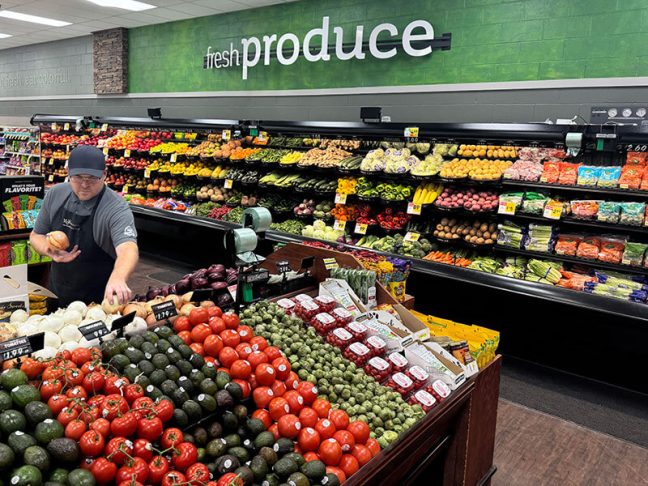
Tate mentioned Nyssa, Oregon, and Parma, Idaho, which are just across the border from one another, as noted onion-growing regions.
“We’ve got some friends that grow onions in the area, and they bring [them] across the street from their packing shed into the store,” he said, adding that the friends come to the stores instead of the shed to buy them.
Many other local crops grace the stores’ produce departments, Tate said. “That is one of the nice things about doing business in these agricultural areas, and we try to reflect that in our stores.”
M&W also supports local purveyors outside of produce.
“One of the great things about being an independent retailer is talking with local producers who are just getting started that might not be able to get into some of those big-box stores,” he said.
“I can think of different products that my wife has found at the farmers market here in Boise. I contacted the producer and brought him in, and it’s been great to watch some of those folks succeed and allowing them to go to other retailers and say, ‘Yeah, we’re in M&W Markets.’ It makes us feel good.
“Being an independent business really helps the communities that we’re in,” Tate reiterated. “The money stays in the community. I like to see our stores be a foothold for the local economies; I like serving the customers in that way. It’s really, really important to me.
“I can’t really overstate how important independent businesses are to these local economies, and being a part of that, it feels really good.”
Team balance, connection
With more than 400 employees across its grocery and convenience store divisions, M&W takes pride in maintaining what Tate calls a “family atmosphere.”
“We have some really great folks,” he says. “Our core people tend to stay around for a real long time, and even some of our frontline people do as well. We really see our team as an extension of our family, and we offer really good work/life balance,” Tate said.
M&W also encourages team building beyond the stores’ four walls.
“All of our stores have Christmas parties and things like that, to get people together outside of the stores,” Tate said.
While staffing challenges have increased post-COVID, he said M&W’s approach remains centered on care and respect.
“We really care about our people; we treat them well.”
Well-rounded support
With its community commitment, it’s not surprising that M&W supports a wide range of causes.
Tate, who worked for a large YMCA in Washington State before coming back to the family business, said that M&W supports 4-H heavily, calling it “one of the most impressive youth programs that I’ve seen.”
In line with his strong interest in community development, Tate added that they also support rodeo, food banks, senior centers, churches that operate food pantries and some school programs.
This year for the first time M&W is participating in the “Harvest for Hope” donation program that was created by wholesale partner Associated Food Stores in Salt Lake City.
The program, which starts Nov. 1, will allow M&W Markets customers to help support local food pantries.
AFS supplies cards that have a PLU on them. “Customers can put money on the card, and we’ll deliver food at cost to the food pantries with some matching donations,” Tate said.
Strong ally
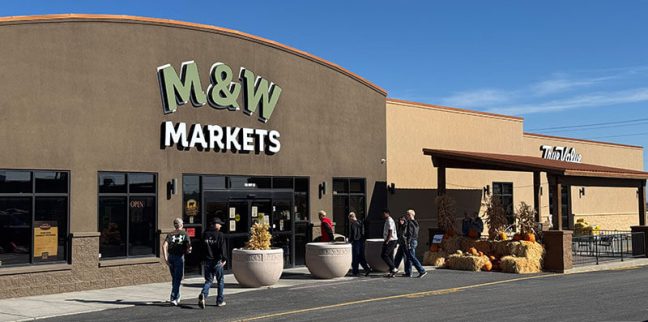
M&W’s relationship with AFS extends well beyond community programs.
“The list is long,” Tate says of the advantages the grocer derives from being affiliated with the wholesaler.
M&W has been focused on technology projects recently, from POS and back-office solutions to digital marketing and loyalty programs for customers, said Tate, who serves on AFS’ councils for technology, retail and advertising.
The grocer is seeing a kind of dichotomy with customers these days when it comes to what they want in their grocery store.
“We do get a sense that people are nostalgic for simpler times, and we try to stick with our roots. But the customer expectations with digital are real, so we are making a lot of efforts in that direction,” he said.
Whatever their needs, Tate said AFS’ retail counselors and advertising team are great at providing that support.
“All the way through we really see them as a critical partner.”
[RELATED: Populous West Home To Dynamic, Diverse Grocery Market]

